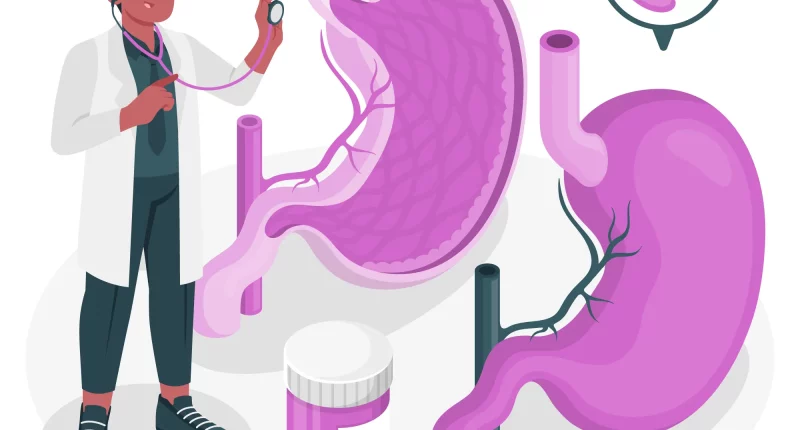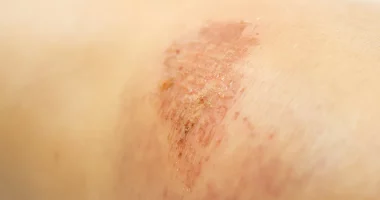Bile Acid Synthesis Defects are a group of uncommon, inherited metabolic disorders that impair the body’s ability to produce bile acids, which are crucial for digesting fats and absorbing fat-soluble vitamins.
These defects result from mutations in genes involved in the bile acid synthesis pathway, leading to a buildup of toxic intermediates in the liver and other tissues. Symptoms can vary but often include liver dysfunction, cholestasis (decreased bile flow), and fat-soluble vitamin deficiencies. Early diagnosis and treatment with specific bile acid supplements can help manage the condition and improve outcomes.
Symptoms
Symptoms of Bile Acid Synthesis Defects can vary widely but often include:
- Cholestasis: Decreased or blocked bile flow, leading to jaundice (yellowing of the eyes and skin).
- Liver Dysfunction: Signs include elevated liver enzymes, hepatomegaly, and liver fibrosis or cirrhosis.
- Fat-soluble Vitamin Deficiencies: Deficiencies in vitamins A, D, E, and K, can cause issues like bone abnormalities, poor vision, muscle weakness, and bleeding disorders.
- Growth Failure: Poor weight gain and growth in babies and children.
- Digestive Problems: Diarrhea, greasy stools, and lower stomach pain.
- Neurological Issues: Developmental delays, intellectual disability, and neurological impairment in some cases.
Early recognition of these symptoms and appropriate treatment can significantly improve the prognosis for individuals with BASDs.
Causes
Bile Acid Synthesis Defects are mainly caused by genetic changes in the enzymes responsible for the production of bile acids in the liver. These enzymes are crucial for converting cholesterol into bile acids, which are essential for fat digestion and absorption.
Mutations in particular genes, like AMACR, CYP7A1, and HSD3B7, disrupt this conversion process, leading to a buildup of toxic intermediates and a deficiency in primary bile acids. These genetic changes are typically run in families in an autosomal recessive pattern, meaning a child must inherit a defective gene from each parent to get the disorder.
In addition to genetic changes, secondary factors can also contribute to the manifestation and severity of BASDs. Environmental factors, like certain toxins or medications, can exacerbate the condition by further impairing liver function and bile acid metabolism.
Additionally, the presence of other underlying health conditions, like liver diseases or metabolic disorders, can influence the onset and progression of BASDs. Early genetic screening and diagnosis are crucial for detecting specific enzyme deficiencies and initiating appropriate treatment to handle the symptoms and prevent complications.
Treatment
Treatment of Bile Acid Synthesis Defects mainly involves the use of oral bile acid supplements to compensate for the deficient or defective bile acids. These supplements, like chenodeoxycholic acid or cholic acid, help restore normal bile flow, enhance liver function, and decrease the build-up of toxic intermediates.
By providing the necessary bile acids, these treatments can alleviate symptoms like cholestasis and vitamin deficiencies, promoting better growth and development in affected individuals. Regular observation of liver function and bile acid levels is essential to adjust the treatment dosage and ensure optimal outcomes.
In addition to bile acid supplementation, management of BASDs may include supportive therapies to address specific complications and symptoms. For instance, fat-soluble vitamin supplements (vitamins A, D, E, and K) are often necessary to correct deficiencies and prevent related health problems.
Dietary modifications, like a low-fat diet, can also help manage digestive symptoms and improve nutrient absorption. In severe cases with significant liver damage and transplantation may be considered as a treatment alternative. Early diagnosis and a comprehensive, individualized treatment plan are crucial for improving the quality of life and long-term outlook for individuals with BASDs.
Causes
Bile Acid Synthesis Defects are mainly caused by genetic mutations that disrupt the normal production of bile acids in the liver.
These changes happen in genes encoding enzymes essential for converting cholesterol into bile acids. For example, changes in genes like HSD3B7, CYP7A1, and AMACR result in the absence or malfunction of specific enzymes required for bile acid synthesis. This disruption leads to a buildup of toxic intermediates in the liver and a deficiency in the bile acids required for fat digestion and nutrient absorption.
The pattern of inheritance of these changes is typically autosomal recessive, defining a child must inherit 2 copies of the defective gene, one from mother and father, to manifest the disorder.
In some cases, secondary factors may also play a role in the seriousness and manifestation of BASDs. Environmental influences, like exposure to certain toxins or medications, can exacerbate the condition by further impairing liver function and bile acid metabolism.
Additionally, the presence of other underlying health conditions, like metabolic disorders or liver diseases, can complicate the clinical picture and impact the progression of BASDs. Genetic screening and early diagnosis are essential for identifying specific enzyme deficiencies and implementing timely and effective treatment strategies to manage the disorder.
Prevention
Preventing Bile Acid Synthesis Defects is challenging due to their genetic nature, but certain measures can help manage risks and enhance outcomes. Genetic counseling is important for families with a history of BASDs, as it can inform prospective parents about the chances of passing the condition to their children.
Prenatal genetic testing can also find carriers of defective genes, allowing for early intervention and planning. While it is not possible to prevent the genetic changes that cause BASDs, early diagnosis and proactive management, including regular observation and appropriate treatment, can significantly mitigate the symptoms and improve the quality of life for affected individuals.
Summary
Bile Acid Synthesis Defects are uncommon genetic disorders caused by mutations in enzymes needed for bile acid production, leading to symptoms like liver dysfunction, cholestasis, and fat-soluble vitamin deficiencies. These mutations are inherited in an autosomal recessive pattern. Treatment involves bile acid supplements and supportive therapies, such as vitamin supplements and dietary modifications. Early diagnosis and genetic counseling are essential for managing BASDs effectively. While prevention is challenging due to the genetic basis, prenatal testing and proactive management can improve outcomes for those affected.









